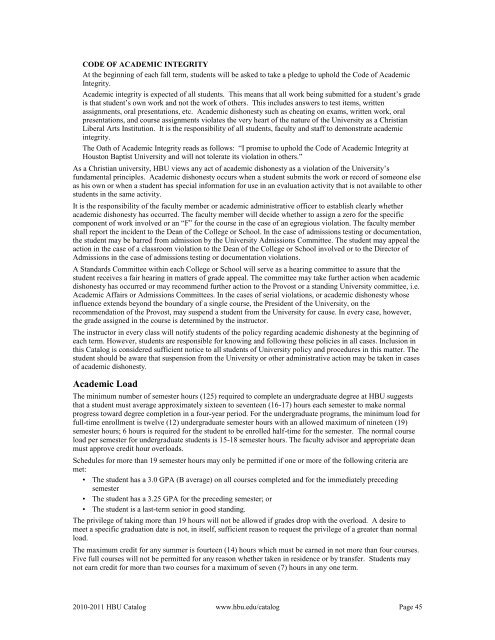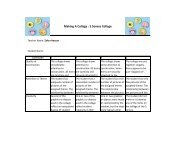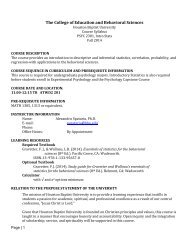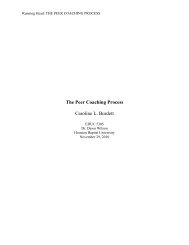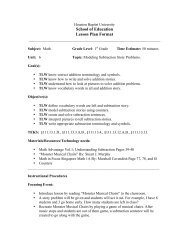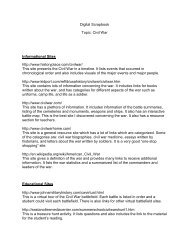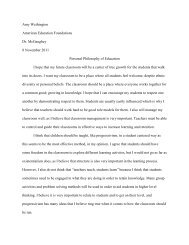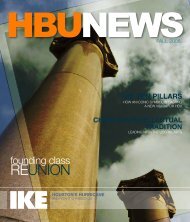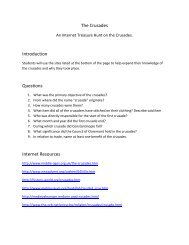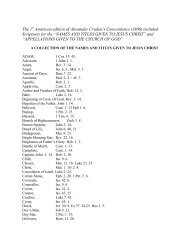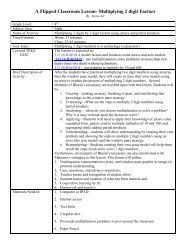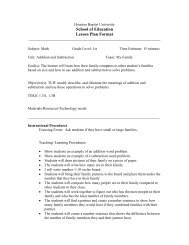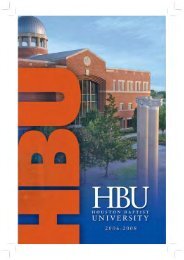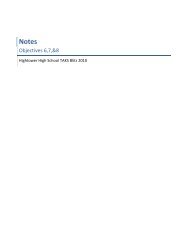2010-2011 HBU Catalog - Houston Baptist University
2010-2011 HBU Catalog - Houston Baptist University
2010-2011 HBU Catalog - Houston Baptist University
You also want an ePaper? Increase the reach of your titles
YUMPU automatically turns print PDFs into web optimized ePapers that Google loves.
CODE OF ACADEMIC INTEGRITY<br />
At the beginning of each fall term, students will be asked to take a pledge to uphold the Code of Academic<br />
Integrity.<br />
Academic integrity is expected of all students. This means that all work being submitted for a student‘s grade<br />
is that student‘s own work and not the work of others. This includes answers to test items, written<br />
assignments, oral presentations, etc. Academic dishonesty such as cheating on exams, written work, oral<br />
presentations, and course assignments violates the very heart of the nature of the <strong>University</strong> as a Christian<br />
Liberal Arts Institution. It is the responsibility of all students, faculty and staff to demonstrate academic<br />
integrity.<br />
The Oath of Academic Integrity reads as follows: ―I promise to uphold the Code of Academic Integrity at<br />
<strong>Houston</strong> <strong>Baptist</strong> <strong>University</strong> and will not tolerate its violation in others.‖<br />
As a Christian university, <strong>HBU</strong> views any act of academic dishonesty as a violation of the <strong>University</strong>‘s<br />
fundamental principles. Academic dishonesty occurs when a student submits the work or record of someone else<br />
as his own or when a student has special information for use in an evaluation activity that is not available to other<br />
students in the same activity.<br />
It is the responsibility of the faculty member or academic administrative officer to establish clearly whether<br />
academic dishonesty has occurred. The faculty member will decide whether to assign a zero for the specific<br />
component of work involved or an ―F‖ for the course in the case of an egregious violation. The faculty member<br />
shall report the incident to the Dean of the College or School. In the case of admissions testing or documentation,<br />
the student may be barred from admission by the <strong>University</strong> Admissions Committee. The student may appeal the<br />
action in the case of a classroom violation to the Dean of the College or School involved or to the Director of<br />
Admissions in the case of admissions testing or documentation violations.<br />
A Standards Committee within each College or School will serve as a hearing committee to assure that the<br />
student receives a fair hearing in matters of grade appeal. The committee may take further action when academic<br />
dishonesty has occurred or may recommend further action to the Provost or a standing <strong>University</strong> committee, i.e.<br />
Academic Affairs or Admissions Committees. In the cases of serial violations, or academic dishonesty whose<br />
influence extends beyond the boundary of a single course, the President of the <strong>University</strong>, on the<br />
recommendation of the Provost, may suspend a student from the <strong>University</strong> for cause. In every case, however,<br />
the grade assigned in the course is determined by the instructor.<br />
The instructor in every class will notify students of the policy regarding academic dishonesty at the beginning of<br />
each term. However, students are responsible for knowing and following these policies in all cases. Inclusion in<br />
this <strong>Catalog</strong> is considered sufficient notice to all students of <strong>University</strong> policy and procedures in this matter. The<br />
student should be aware that suspension from the <strong>University</strong> or other administrative action may be taken in cases<br />
of academic dishonesty.<br />
Academic Load<br />
The minimum number of semester hours (125) required to complete an undergraduate degree at <strong>HBU</strong> suggests<br />
that a student must average approximately sixteen to seventeen (16-17) hours each semester to make normal<br />
progress toward degree completion in a four-year period. For the undergraduate programs, the minimum load for<br />
full-time enrollment is twelve (12) undergraduate semester hours with an allowed maximum of nineteen (19)<br />
semester hours; 6 hours is required for the student to be enrolled half-time for the semester. The normal course<br />
load per semester for undergraduate students is 15-18 semester hours. The faculty advisor and appropriate dean<br />
must approve credit hour overloads.<br />
Schedules for more than 19 semester hours may only be permitted if one or more of the following criteria are<br />
met:<br />
• The student has a 3.0 GPA (B average) on all courses completed and for the immediately preceding<br />
semester<br />
• The student has a 3.25 GPA for the preceding semester; or<br />
• The student is a last-term senior in good standing.<br />
The privilege of taking more than 19 hours will not be allowed if grades drop with the overload. A desire to<br />
meet a specific graduation date is not, in itself, sufficient reason to request the privilege of a greater than normal<br />
load.<br />
The maximum credit for any summer is fourteen (14) hours which must be earned in not more than four courses.<br />
Five full courses will not be permitted for any reason whether taken in residence or by transfer. Students may<br />
not earn credit for more than two courses for a maximum of seven (7) hours in any one term.<br />
<strong>2010</strong>-<strong>2011</strong> <strong>HBU</strong> <strong>Catalog</strong> www.hbu.edu/catalog Page 45


